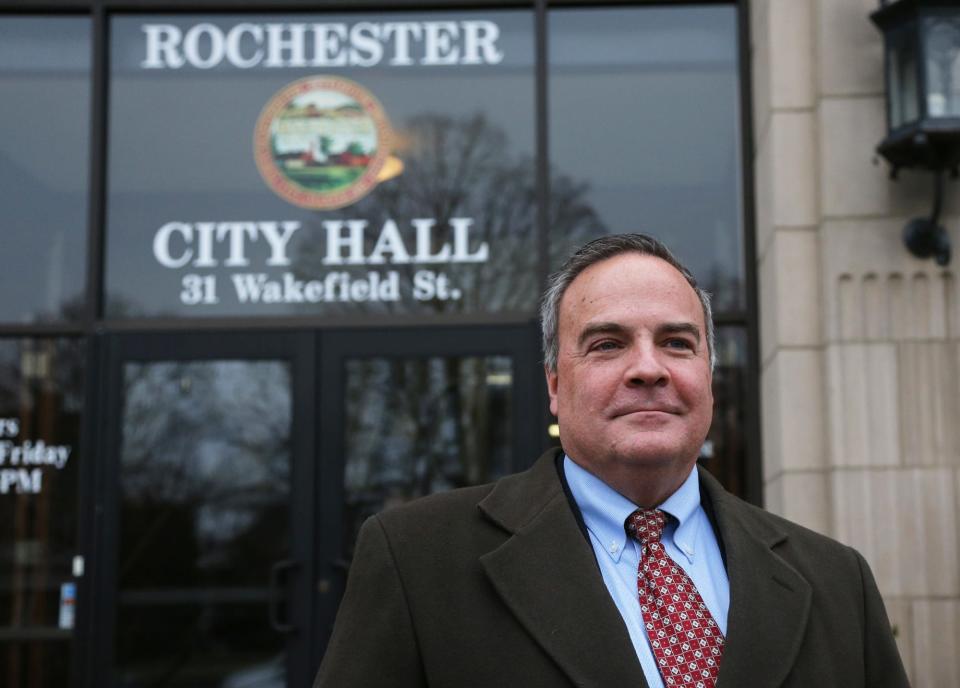Rochester mayor, manager say vote-counting machines will remain in place. Debate on law an open question.
ROCHESTER — Experts disagree on whether city governments in New Hampshire could end the use of vote-counting machines for elections on their own. Rochester's city manager and mayor are making it clear they have no intention of doing that anyway, despite a citizen petition requesting it.
Mayor Paul Callaghan said he wants city voters to be reassured that the AccuVote counting machines are accurate, and a process is in place to keep it that way.
Callaghan said Tuesday the machines are inspected before and after an election.

"We just had three recounts (from November elections), two in Ward 4, and one in Ward 2," said Callaghan. "That's 33% of our wards. The result was 99% accuracy. The recounts did not really change anything. I believe our machines are accurate."
"Nothing will be happening with the voting machine petition unless the folks who submitted it follow up in some manner," City Manager Blaine Cox said Tuesday.
Previous story: Rochester latest NH community to see effort to remove vote-counting machines
Last week, a petition calling to end the use of AccuVote machines in Rochester was submitted by a group of 30-plus residents. The petition was technically flawed because it asked for a warrant article to be the change mechanism. Being a city, Rochester is governed by a mayor and City Council and does not have warrant articles that are used in towns that hold annual Town Meetings.
State Sen. Jim Gray, R-Rochester, said he believes the voting machines are accurate, but if the mayor chose to put the question on a council agenda, it might be considered. Rochester City Attorney Terence O'Rourke said he believes the City Council cannot take that action because, in his opinion, no legal mechanism exists to allow it.
The Edge at Berwick: What's coming to the first building in a project to transform downtown
New Hampshire Secretary of State David Scanlan referred questions to Bud Fitch, elections legal counsel for the secretary of state. Fitch said Monday there is no definitive answer.
"The statue that authorizes the selectmen to pilot test ballot counting devices in towns, to approve their use does not specifically address stopping their use," Fitch said. "Our general understanding of the law, in this type of context, is that if they can start doing something, they have authority to stop."
Fitch said he is aware that some attorneys for towns or cities have taken a different position, similar to O'Rourke, saying they cannot stop without a legal avenue to do so.
"Until someone brings a case into court and asks for a specific exit provision in the law, I am not sure there is a black letter answer to the question of who and under what circumstances can a municipality stop the use," Fitch said.
For example, Fitch said, if a town passed a warrant article to stop the use of the vote-counting machines, and if the town's selectmen refused, citing the fact that the statute does not have a stop clause, "the petitioners could sue."
'Gives us a sense of hope': Take Out Hunger is back on Seacoast helping people in need and restaurants, too
"The court could rule that the statute allows the town to stop using the machines," Fitch said. "They could say that a provision has to be added to the law to make it legal to stop. The legislature could revise the statute, or create a new one to address the question. The Legislature can step in at any time."
In December, a special town meeting was held in Greenland, on a petitioned warrant article asking town officials to discontinue the use of AccuVote machines to count ballots. The bid to eliminate vote-counting machines was rejected by a wide margin with 90% of voters supporting the continued use of the machines.
Doubt in election results has been fueled by former President Donald Trump, who maintains without evidence a claim there was widespread voter fraud in the 2020 election, including in New Hampshire, and spread conspiracy theories that voting machines are susceptible to hacks. These claims persist despite dozens of losses in courts across the country in which Trump and his attorneys lost their cases after failing to provide evidence of voter fraud.
New Hampshire's secretary of state and Republican Gov. Chris Sununu have responded to claims of election problems in the state by stating the vote-counting machines accurate and reliable. Election officials have said the machines are not connected to the internet and point out, as Callaghan did, that paper ballots serve as a backup when there is a recount.
This article originally appeared on Fosters Daily Democrat: Rochester NH mayor, manager say vote-counting machines

